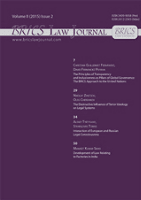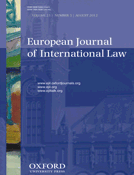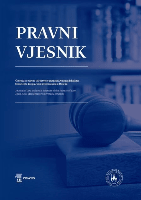
Pravo-Zhurnal Vysshei Shkoly Ekonomiki
Scope & Guideline
Unlocking Knowledge: Law Meets Education
Introduction
Aims and Scopes
- Interdisciplinary Legal Studies:
The journal publishes research that intersects law with other fields such as economics, sociology, and technology, addressing contemporary legal challenges. - Focus on Digital and Cyber Law:
A significant portion of the journal's articles explores the legal implications of digital technologies, including issues related to digital rights, e-commerce, and cybersecurity. - International and Comparative Law:
The journal emphasizes comparative legal studies, offering insights into how different jurisdictions handle similar legal issues, particularly in areas like human rights, public law, and environmental law. - Regulatory Frameworks and Compliance:
Research often discusses the effectiveness and evolution of regulatory frameworks in various sectors, including finance, labor, and digital economies, analyzing compliance challenges. - Legal Theory and Philosophy:
The journal includes articles that delve into legal theory, principles, and the philosophical underpinnings of law, fostering a deeper understanding of legal concepts. - Historical and Cultural Perspectives on Law:
It also addresses the historical evolution of legal systems and cultural influences on law, providing context to contemporary legal practices.
Trending and Emerging
- Legal Implications of Artificial Intelligence and Technology:
Recent articles increasingly address the legal challenges posed by advancements in artificial intelligence, including regulatory frameworks for AI, digital rights, and technology's impact on legal practices. - E-commerce and Digital Economy Regulation:
With the rise of e-commerce, there is a growing focus on the legal frameworks governing online transactions, consumer protection, and digital contracts, highlighting the need for updated legislation. - Environmental Law and Sustainable Development:
Emerging themes in environmental law are gaining importance, particularly those related to climate change, sustainability, and the legal responsibilities of states and corporations. - Human Rights in the Context of Globalization:
The journal increasingly publishes works that explore human rights issues within the framework of globalization, including the impact of international law on domestic practices. - Criminal Law in the Digital Age:
There is a rising trend in examining the intersection of criminal law with digital technologies, including cybercrime, data protection, and the implications of new forms of crime in a digital landscape.
Declining or Waning
- Traditional Public Law:
There is a noticeable decrease in articles focusing exclusively on traditional public law concepts and doctrines, as the journal shifts towards more dynamic and contemporary legal issues. - Historical Legal Analysis:
Research focusing on historical legal analysis, particularly studies that do not connect to modern legal challenges, seems to be less frequent, reflecting a trend towards practical applications of legal theories. - Niche Areas of Law:
Certain niche areas, such as specific local laws or outdated regulatory frameworks, have seen a decline in scholarly attention, possibly due to the increasing relevance of broader, more universal legal issues.
Similar Journals

Studia Prawnicze KUL
Bridging Theory and Practice in LawStudia Prawnicze KUL is an esteemed academic journal published by the John Paul II Catholic University of Lublin, dedicated to the exploration of legal studies and philosophy of law. With the ISSN 1897-7146 and E-ISSN 2719-4264, this journal has adopted an Open Access model since 2019, ensuring that its noteworthy contributions to the field are freely accessible to scholars, practitioners, and students worldwide. The journal aims to disseminate rigorous research, theoretical insights, and practical perspectives in law, fostering scholarly dialogue and collaboration among its diverse readership. As a significant platform for legal scholarship in Poland, Studia Prawnicze KUL provides a vital resource for anyone engaged in the complexities of legal theory and practice, making an important impact in the field of legal studies.

Utrecht Journal of International and European Law
Connecting Scholars Across BordersUtrecht Journal of International and European Law, published by UBIQUITY PRESS LTD, serves as a dynamic platform for the dissemination of scholarly research in the realms of international and European law. Since its inception as an open-access journal in 2013, it has provided unrestricted access to cutting-edge legal scholarship, fostering global dialogue among legal professionals, researchers, and students. With a notable Scopus rank of 249 out of 1,025 in the law category and a commendable Q3 rating, the journal emphasizes innovative legal theories and practices relevant to contemporary global challenges. Located in the heart of the United Kingdom, the Utrecht Journal is committed to maintaining high academic standards while also promoting the exchange of knowledge across borders, which is crucial given the ever-evolving landscape of international law. As it converges its focus from 2020 to 2024, the journal seeks to become an essential reference for those dedicated to the exploration and expansion of legal discourse in this vital field.

Vestnik Permskogo Universiteta-Juridicheskie Nauki
Advancing Legal Scholarship for a Global AudienceVestnik Permskogo Universiteta-Juridicheskie Nauki, published by the Perm State National Research University, serves as a prominent platform for the dissemination of legal scholarship since its inception. With an Open Access policy implemented in 2009, this journal offers a wide range of legal studies, including comparative law, constitutional law, and international law, making it an essential resource for researchers, academics, and practitioners in the field. Although it is a relatively young publication, its commitment to quality and accessibility has established it as a respected voice in jurisprudence, contributing significantly to both national and international legal discourse. Researchers and students alike will find valuable insights within its pages, encompassing the latest developments and theoretical advancements within Russian and global legal systems. For those looking to stay informed on current legal issues and academic debates, this journal is a must-read.

Revista do Curso de Direito do UNIFOR
Cultivating interdisciplinary collaboration in legal studies.Revista do Curso de Direito do UNIFOR, with ISSN 2236-7632, is a distinguished academic journal published by FUNDACAO EDUCACIONAL COMUNITARIA FORMIGUENSE in Brazil. Specializing in the field of legal studies, this journal aims to disseminate high-quality research that contributes to the understanding and development of legal theory and practice. Although the journal is currently not Open Access, it serves as a valuable platform for scholars and practitioners to share insights and advancements in law, fostering a robust dialogue among legal professionals, academics, and students. By maintaining rigorous academic standards, Revista do Curso de Direito do UNIFOR plays a crucial role in shaping legal discourse and encouraging interdisciplinary collaboration within the broader context of legal education. Researchers and students alike are encouraged to submit their work to advance the academic community's knowledge and engagement in contemporary legal issues.

COLUMBIA JOURNAL OF TRANSNATIONAL LAW
Fostering Dialogue on International Legal Challenges.The COLUMBIA JOURNAL OF TRANSNATIONAL LAW, published by the COLUMBIA JOURNAL TRANSNATIONAL LAW ASSOCIATION, stands as a premier academic platform in the fields of Law, Political Science, and International Relations. Having maintained a commendable Q2 ranking in both law and political science categories for 2023, it represents a vital resource for scholars and practitioners alike in navigating the complexities of transnational legal issues from 1996 to 2024. Situated in the U.S. at the esteemed Columbia University School of Law, the journal not only meets the rigorous academic standards but also addresses pressing global challenges through interdisciplinary research. Although it does not currently offer open access options, its commitment to providing insightful analyses and fostering robust scholarly dialogue in a rapidly changing world remains paramount. With its inclusion in reputable databases like Scopus, the journal is poised to impact the academic landscape significantly, catering to both emerging and established voices in transnational law.

BRICS Law Journal
Shaping the Future of Law in Diverse NationsBRICS Law Journal is a prominent peer-reviewed publication dedicated to the exploration and critical analysis of legal issues pertinent to the BRICS nations—Brazil, Russia, India, China, and South Africa. Published by LLC V EM PUBLISHING HOUSE, this journal has established itself as an essential resource since its inception in 2014, offering Open Access to foster global research dissemination and collaboration. With an impact factor that reflects its academic rigor, the journal has achieved a commendable Q2 ranking in the field of Law as per the 2023 category quartiles. It is indexed in Scopus, where it holds a rank of #615/1025 in Social Sciences—Law, showcasing its relevance and influence within the legal scholarly community. The BRICS Law Journal aims to address contemporary legal challenges and policy developments in the region, making it a vital resource for researchers, practitioners, and students seeking to engage with the evolving legal landscape and contribute to the discussions that shape the future of law in these diverse nations.

ZBORNIK PRAVNOG FAKULTETA SVEUCILISTA U RIJECI
Bridging Theory and Practice in LawZBORNIK PRAVNOG FAKULTETA SVEUCILISTA U RIJECI, with ISSN 1330-349X and E-ISSN 1846-8314, is a distinguished academic journal published by the University of Rijeka, Faculty of Law, Croatia. Since its inception, the journal has steadfastly committed to promoting legal scholarship and fostering academic dialogue within the field of law. With an Open Access model adopted since 2006, ZBORNIK allows researchers, practitioners, and students universal access to its invaluable content, enhancing the dissemination of knowledge across borders. This journal serves as a pivotal platform for innovative legal research, covering a diverse range of topics pertinent to both national and international legal frameworks. The journal’s importance in the legal community is further underscored by its efforts to bridge theory and practice, making it an essential resource for anyone engaged in legal studies. For scholars looking to contribute to an inclusive discourse in legal academia, ZBORNIK PRAVNOG FAKULTETA is an ideal venue.

European Journal of International Law
Connecting scholars to pressing international legal issues.The European Journal of International Law (EJIL), published by Oxford University Press, stands as a leading platform for the dissemination of innovative research in the realms of International Law and Political Science. With an impressive ISSN of 0938-5428 and E-ISSN of 1464-3596, this prestigious journal has achieved Q1 rankings in both Law and Political Science and International Relations categories as of 2023, emphasizing its significance among contemporary scholarly publications. Spanning contributions from a diverse range of disciplines, the EJIL serves as an essential resource for researchers, professionals, and students alike, promoting critical dialogue on pressing international legal issues. Although currently not offered as an open-access journal, it continues to retain a high impact factor, as evidenced by its substantial Scopus rankings, placing it within the top percentiles in multiple categories. Its commitment to scholarly excellence is reflected in a convergence of research trends from 2005 to 2024, and it remains dedicated to fostering informed discourse on global legal frameworks and their implications.

University of Pennsylvania Journal of International Law
Exploring the Frontiers of International LawThe University of Pennsylvania Journal of International Law is a pivotal academic publication that serves as a forum for groundbreaking legal scholarship, particularly in the complex and dynamic field of international law. Published by the University of Pennsylvania Law School, this journal supports a diverse array of interdisciplinary research and discourse, capturing insights that bridge legal, economic, and political landscapes. As of 2023, it is positioned in Quartile 3 in Law and Quartile 4 in Economics according to Scopus rankings, underscoring its relevance and contributions to legal academia. The journal is accessible through conventional methods, with its physical presence anchored in Philadelphia, Pennsylvania. With a commitment to fostering dialogue on both emerging and traditional legal issues, the journal aims to engage scholars, practitioners, and students alike, encouraging contributions that enrich understanding and drive progressive legal thought. This commitment to academic excellence ensures that the University of Pennsylvania Journal of International Law remains a vital resource for those seeking to navigate the challenges of international legal frameworks.

Pravni Vjesnik
Empowering Legal Scholarship, Open to All.Pravni Vjesnik is a peer-reviewed academic journal published by the Pravni Fakultet Sveučilišta Josipa Jurja Strossmayera & Osijek, primarily focusing on the field of law within the social sciences. Since transitioning to an Open Access model in 2016, the journal has broadened its accessibility, allowing researchers, professionals, and students to engage with diverse legal scholarship without subscription barriers. With an ISSN of 0352-5317 and an E-ISSN of 1849-0840, Pravni Vjesnik plays a crucial role in disseminating knowledge and fostering discourse in the legal community, particularly within the context of the Croatian legal system and broader European legal frameworks. Although it holds a rank of #760 out of 1025 in the Scopus database, placing it in the 25th percentile of law journals, its commitment to quality and relevance ensures its importance as a resource for rigorous academic inquiry. The journal's scope is anticipated to expand from 2019 to 2024, promoting ongoing research in contemporary legal issues. This dedication to publishing comprehensive and impactful studies makes Pravni Vjesnik an essential platform for those involved in the legal field.